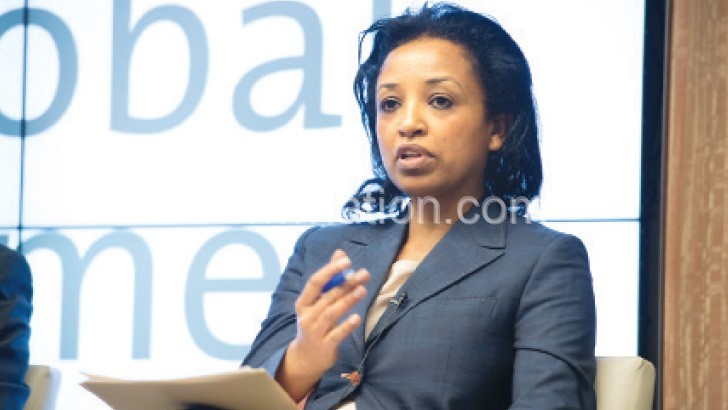Mimi Alemayehou: Executive Vice-President for OPIC
Mimi Alemayehou is the second most powerful person at the Overseas Private Investment Corporation [OPIC], the US government’s development finance institution headquartered in the nation’s capital, Washington D.C. Nominated as the Executive Vice President of the organisation by President Barack Obama on March 10th 2010 and confirmed unanimously by the full US Senate. The mother of two is as much a modern woman as she is an African woman. A global power player with a tres chic sense of fashion, Alemayehou is a naturalised US citizen who was born in Ethiopia and spent her early years in Kenya before immigrating to the United States. Farai Gundan of Forbes Magazine spoke with Alemayehou to learn more about her career journey.
‘How did it feel being nominated by a US President and unanimous confirmation by US Senate?
It was a huge honour. I feel privileged to help lead an agency that is making a real difference around the world every day. OPIC’s work supporting American businesses and mobilising investment in emerging markets is particularly relevant today at a time when the private sector is playing such a key role in development.

Can you give us an insight to your specific role and responsibilities with OPIC?
I co-manage the US government’s development finance institution which has a portfolio of more than $16 billion invested in over 100 countries. I help lead an amazingly dedicated and talented team of professionals who work to provide the expertise and creative solutions to foster investment in these challenging places and to address major world challenges from poverty and hunger to access to electricity and financial services. While OPIC’s focus is on development, we apply financial rigor to our work and consistently generate a net profit.
Tell me about more about your formative years, college life, and early career path and how you got where you are?
I was definitely impacted by my early years in Ethiopia, as was every Ethiopian of my generation that lived through the Red Terror years. Seeing family members and friends imprisoned and killed for political reasons gave me a very early life lesson in the pursuit of freedom, not just political, but economic freedom. My parent’s and grandparent’s properties were expropriated and overnight they and many other families lost everything they had worked hard for. That’s a lesson that’s hard to forget.
My most impressionable years were spent in Kenya, where for the first time I met people that were not Ethiopians. I still have more friends in Kenya than I do in my country of birth. I was fortunate enough to have had parents who valued education and particularly to have had a mother and grandmother who were progressive, loving and had the same expectations of me as they did for my brothers. In fact, my brothers would argue that our parents expected more from me than them. The first successful entrepreneur I knew well and looked up to was my grandmother. She could not read or write, but she was one of the smartest women I have ever known. I often wonder how far she would have gone if she had been allowed to go to school by her parents, who chose only to send the boys to school.
I got to where I am today partly because I did not always listen to the advice I got. For example, earlier in my career I was always interested in working on Capitol Hill, but a lot of people including some of my own family members told me that there was no way a member of Congress would hire someone who was not an American citizen. I pursued this dream anyway and was ultimately hired as legislative staffer on Capitol Hill. I have found it invaluable to question things and not necessarily take “no” for an answer.
How did you know you were on the right path as far as your career is concerned? What is your ultimate role? President of Ethiopia, World Bank?
I don’t believe there is such a thing as a perfect position or a dead-end job. At every step, you learn. Life is a journey of learning. I have no desire to run for political office, but I care deeply about development in Africa and around the world. That has driven my professional decisions to improve people’s lives and I want to be a part of that. I just returned from a trip to South Africa and Tanzania where I was fortunate to be part of Obama’s dialogue with business leaders from across the continent. Africa remains a place of great challenges as well as great opportunities.
Can you describe the current landscape for women in general and African women in particular as far as career opportunities available to them?
When I was on the board of the African Development Bank, I was the only woman and I served with 17 men. While some things have changed for women, many things have not. When I returned to Washington in 2010, President Obama also nominated me to be on the board of the African Development Foundation, where I was once again the only woman. Today, there are still very few women serving on the boards of Fortune 100, Fortune 500 companies. What that means is that we are not making the best use of 50 percent of our talent. One of my favourite quotes is from Christine Lagarde who said if Lehman Brothers behaved more like Lehman Sisters, things might have turned out differently for the bank. We have a way to go on this issue.
You previously served as the United States Executive Director at the African Development Bank and in that role you were the most senior US Treasury official in Africa. What are some of the highlights of the time you spent there? What were some of the challenges?
The highlights were the projects we approved that created thousands of jobs and improved lives in Africa. We approved a modern highway construction project in Senegal and multiple power projects and port projects. I have tremendous respect for my friend Donald Kaberuka who has been a great leader of the institution.
The challenge was making sure that Africans were involved at every level in their own development agenda. It often surprised me that NGOs in the Western world had more to say than local groups about projects taking place in Africa. Too often, the African voice is lost or discounted. We have to build stronger civil society in Africa that can speak adequately on behalf of their people.
What are the specific emerging markets that your organization targets and which sectors? How are the regions and sectors determined for investment by OPIC?
OPIC provides loans, guarantees and risk mitigation products such as political risk insurance to companies, entrepreneurs and NGOs that pioneer investment in developing nations.
We work in countries across the globe, from Afghanistan to Kenya, the Far East and Latin America and in a variety of sectors including power, agriculture, small & medium enterprise (SME) lending, housing, infrastructure and manufacturing. Currently, Africa is our largest portfolio region and our fastest growing.
We pride ourselves in being nimble, flexible and ready to take risks that commercial banks will not as well as developing with our clients the kind of creative and accommodating structures that investing in frontier market requires.
In June of 2012, Obama unveiled a new Presidential Policy Directive on Sub-Saharan Africa, which further codified the United States’ long-standing commitment to the nations and peoples of the region.—Forbes.com



